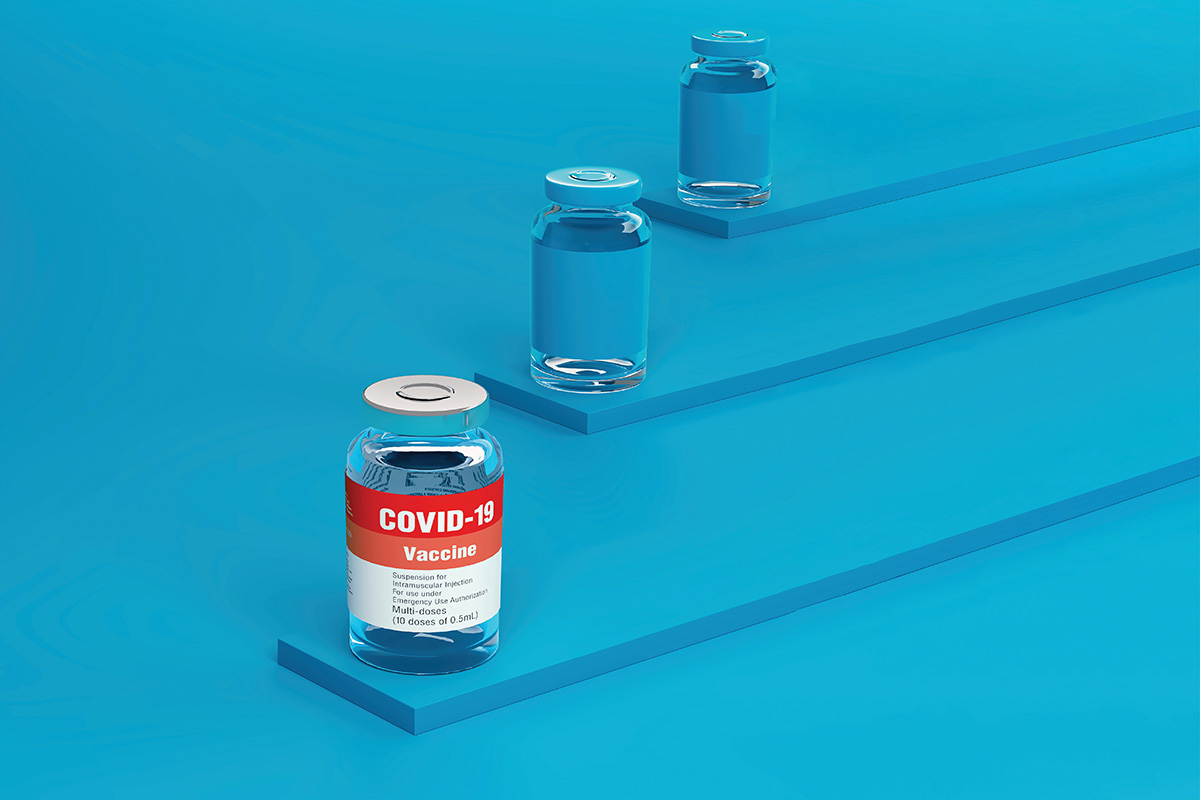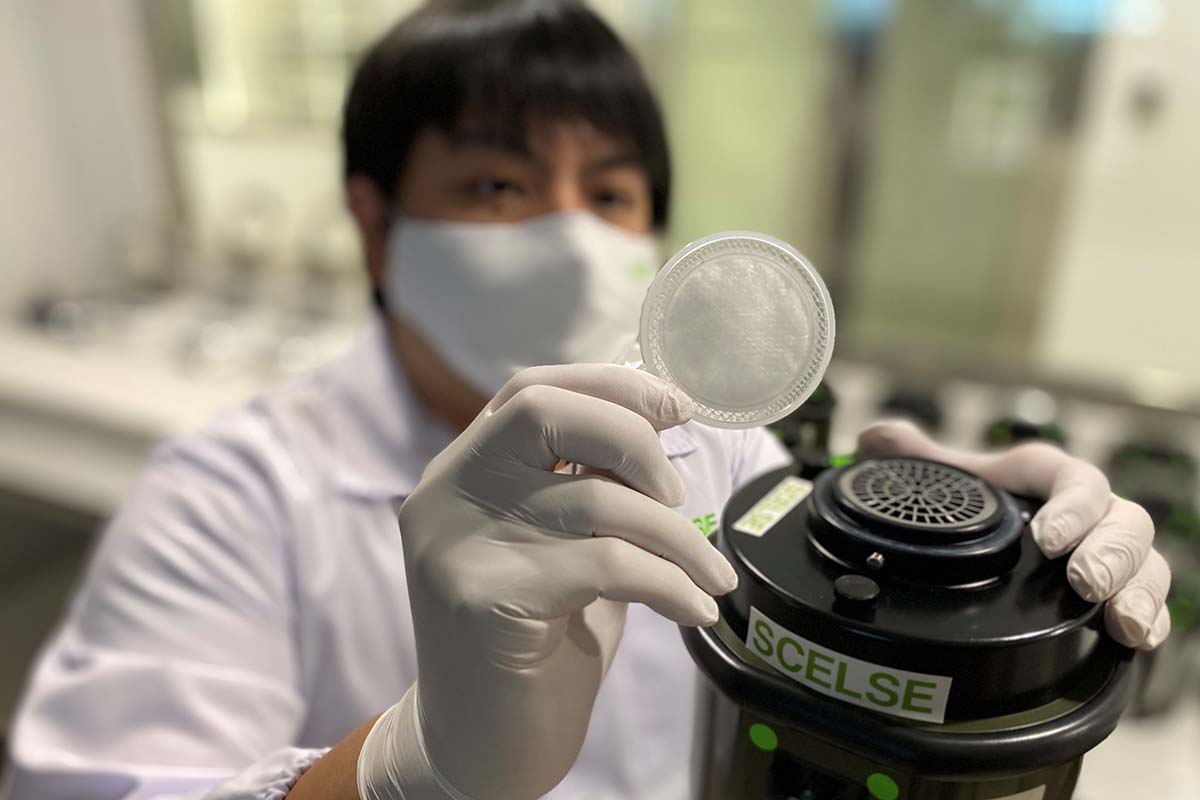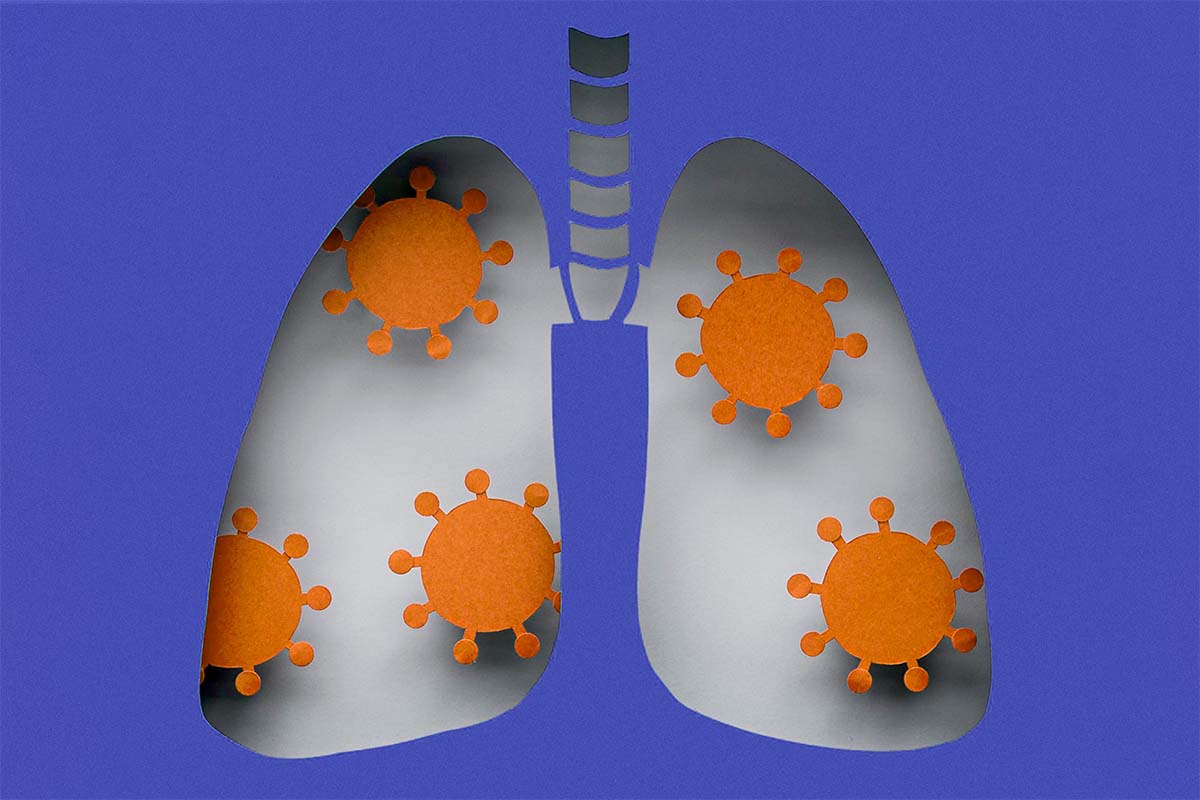
Issue 41 / February 2022
COVID-19 Special
Next-Generation Vaccines Much Needed Enhancements in Anti-COVID-19 Fight

As we move into our third year of living with the pandemic, life still hasn’t returned to “normal.” This is despite the fact that we have several very effective COVID-19 vaccines. The reason that we’re still wearing masks and social distancing can be summed up in one word: variants. And the pandemic-sized question now is: How effective are the current and new vaccines against these SARS-CoV-2 variants?
n the developed world, the “big three” COVID-19 vaccines are the Pfizer and Moderna mRNA vaccines, as well as the Johnson & Johnson viral vector vaccine. In developing countries, where these vaccines have been harder to come by, vaccines from China and Russia are more commonly used. So how are the first-generation and next-generation vaccines performing against SARS-CoV-2 variants?
What are viral variants and which ones should we be concerned about?
Viral variants arise as a virus infects increasing numbers of people and populations. RNA viruses such as SARS-CoV-2 naturally mutate over time. Most of these mutations don’t significantly impact how the virus behaves. However, when the occurrence of a mutation confers an advantage on the virus, such as allowing antibodies induced by a vaccine to escape, these mutated viruses will be able to reproduce. These viruses are called variants.
In response to the rapidly changing landscape of SARS-CoV-2 variants, vaccine manufacturers have been testing the efficacy of their first- and next-generation vaccines against the predominant variants of concern or variants of interest at the time of testing.
When the first of these “variant” trials were conducted in mid-2021, four main variants of concern were identified by the World Health Organization (WHO) as affecting the world’s populations: 1) the B.1.1.7 lineage (called the Alpha variant) that was first identified in the United Kingdom; 2) the B.1.351 lineage (called the Beta variant) that was identified in South Africa; 3) the P.1 lineage (called the Gamma variant) that was identified in Brazil; and 4) the B.1.617 lineage (called the Delta variant) that was first found in India.1
All variants of concern identified to date have multiple mutations. For example, the Alpha variant has mutations in the receptor binding domain, the N-terminal region, and near the furin cleavage site of the S protein.1 In addition, these variants share a mutation called D614G, which increases the ability of the virus to infect people.
In the last months of 2021, the Omicron (B.1.1.529.1) variant started to spread around the world. It has many more mutations than previously identified variants, most of which are in the gene coding for the spike protein. The Omicron variant also appears to be more contagious than other variants. However, the net effect of Omicron’s many mutations on the severity of the disease that it causes is still unclear. A small study conducted by the Centers for Disease Control and Prevention, the results of which were reported on 8 December 2021, found that 79% of Omicron infections occurred in people who had received at least one dose of a COVID-19 vaccine.2 The study did not report any deaths due to Omicron. Since then, deaths from Omicron have been reported in various countries, but the death rate appears to be much lower than previous waves of infection with other variants.3
The next generation of COVID-19 vaccines
Novavax subunit vaccines
Arguably the frontrunner in this wave of second-generation vaccines is the one developed by the US-based Novavax. The company did not release a first-generation vaccine, and its NVX CoV2373 is a subunit vaccine consisting of the SARS-CoV-2 spike protein incorporated in a nanoparticle and administered together with a substance called an adjuvant that helps to further stimulate the immune system.
The Novavax vaccine showed 90% efficacy in Phase 3 clinical trials and, importantly, a high efficacy (86%) against the Alpha variant of SARS-CoV-2 (B.1.1.7).3
In another study (PREVENT-19), the vaccine showed 93% efficacy against variants of concern (Alpha, Beta, Delta, and Gamma) and variants of interest (Epsilon, Iota, Kappa, and Zeta) at the time of the study.4 NVX CoV2373 was approved by WHO for emergency use on 17 December 2021 and by the European Medicines Agency (EMA) on 21 December 2021. Novavax also expects to apply to the US Food and Drug Administration for emergency use authorisation by the first quarter of 2022. Since NVX CoV2373 is one of the vaccines that will be distributed to developing countries by the non-profit organisation Covax, these approvals are an important step forward in increasing vaccination in the developing world, which is far behind richer countries in vaccination rates.
“Viral variants arise as a virus infects increasing numbers of people and populations. RNA viruses such as SARS-CoV-2 naturally mutate over time. Most of these mutations don’t significantly impact how the virus behaves.”
Currently, NVX CoV2373 is the only vaccine that has shown efficacy (>90%) against Alpha, Beta, and Delta variants in Phase 3/4 clinical trials. Novavax is currently developing another vaccine featuring a spike protein that has been modified to resemble the Omicron variant.6 It expects to manufacture this Omicron-specific vaccine in January 2022.
Pfizer-BioNTech mRNA vaccines
The mRNA vaccines produced by Pfizer and Moderna were the first to be approved and distributed in developed countries. Showing more than 90% efficacy at combating the original SARS-CoV-2 strain, the vaccines have helped to slow the spread of SARS-CoV-2 infections and reduce the rates of severe disease and death due to COVID-19.
The Novavax
vaccine showed
93%
efficacy against
Alpha, Beta,
Gamma and Delta
variants in the
PREVENT-19 study
The Pfizer-
BioNTech
mRNA vaccine
showed over
90%
efficacy at
combating the
original
SARS-CoV-2
infections and
reducing severe
diseases
Another advantage of the mRNA vaccines is that they are more easily adaptable than other vaccines that use part or all of the virus or viral proteins. The most important step in developing a new mRNA vaccine is modification of the DNA template that is used to produce the mRNA.
Pfizer has adapted its COVID-19 vaccine (BNT162b2) to produce a next-generation vaccine that specifically addresses the Delta variant and is working on another next-generation vaccine to address the Beta variant. However, the company did not release these new vaccines because its original vaccine appears to be reasonably effective against the Delta and Beta variants.7
A small study conducted in Hong Kong, published in MedRxiv on 14 December 2021 showed that only 20% to 24% of the 25 people who received two doses of the BNT162b2 vaccine produced neutralising antibodies against Omicron.8 Pfizer has already started developing a next-generation vaccine against the Omicron variant and is watching how Omicron infections respond to the current vaccine to determine whether this new vaccine needs to be released. According to the CEO of Pfizer, Albert Bourla, the company can develop a new vaccine within 100 days.7
Moderna mRNA vaccines
Similarly, Moderna has also been testing its mRNA vaccine, mRNA-1273, against the Beta and Delta variants, with preliminary results indicating strong efficacy against these variants. Moderna is also developing a vaccine specific for the Beta variant and started testing it in a Phase 1 trial in March 2021. To address infections from the Omicron variant, the company is focusing on increasing the levels of neutralising antibodies to SARS-CoV-2 by means of a booster shot to its initial two-dose vaccine.9 In addition, Moderna is working on developing a booster that is specific for Omicron. According to Moderna, preliminary results indicate that the booster increases the level of neutralising antibodies against Omicron by 37 to 83 times (depending on the booster dose); these results have not been published yet.
Moderna’s
preliminary
results show
that its booster
increases the level
of neutralising
antibodies against
Omicron by
37 to 83
times
A single dose
of Johnson and
Johnson’s vaccine
shows
52%
efficacy at 14 days
and
64%
efficacy at 28 days
against the Beta
variant
A study on
Sinopharm’s
vaccine found that
78.1%
of research
subjects who
received a third
dose of the
vaccine had
some neutralising
antibodies against
Omicron
Janssen/Johnson & Johnson viral vector vaccines
Johnson and Johnson’s first-generation COVID-19 vaccine, Ad26.COV2.S, is a viral vector vaccine (an adenovirus vector into which the spike protein of SARS-CoV-2 has been introduced). A single dose of Ad26.COV2 (single doses are typical for viral vector vaccines) showed 52% efficacy at 14 days and 64% efficacy at 28 days.10 At the time of the trial, 95% of the South African participants (who comprised 15% of the total number of participants) were infected with the B.1.351 (Beta) variant, suggesting that Ad26.COV2.S may offer some protection against the Beta variant. However, the efficacy of the vaccine against SARS-CoV-2 variants was not specifically tested. Although the company is said to be working on a next-generation subunit vaccine, not much is known about it.
GSK and CureVac mRNA vaccines
Like Novavax, the British pharmaceutical giant GSK and German company CureVac are combining forces and hoping to leap past competitors by releasing a second-generation COVID-19 vaccine without first putting out a first-generation one.
GSK and CureVac expect to start clinical trials on their frontrunner second-generation vaccine candidate, an mRNA vaccine called CV2CoV, in early 2022. Preliminary data indicates that CV2CoV has 10 times the ability to stimulate the immune response in animal models, compared with the first-generation vaccine that CureVac has stopped working on for the time being.11
Sinopharm and Sinovac inactivated whole-virus vaccines
The Chinese vaccines Coronavac (produced by Sinovac) and BBIBP-CorV (developed by Sinopharm) are widely used in China, South America, and Africa. In the same study in Hong Kong mentioned above, researchers found that none of the 25 people who received two doses of the Coronavac vaccine produced detectable neutralising antibodies against the Omicron variant.8 Another study, published in BioRxiv in December 2021, showed that BBIBP-CorV and the Russian vaccine Sputnik V did not produce detectable neutralising antibodies against Omicron.12
Researchers at Shanghai Jiao Tong University and a lab in Shanghai that specialises in respiratory infectious diseases are conducting a study of BBiBP-CorV in 292 healthcare workers who received a third dose of the BBIBP-CorV vaccine. The researchers reported that 78.1% of subjects had some neutralising antibodies against Omicron, but they have not published their findings yet.13
“The important thing now is to slow viral transmission, by expanding vaccination coverage and maintaining preventive measures, to provide valuable time for drug development and distribution.”
What do we do now?
According to the results we have so far, two doses of current vaccines such as the Pfizer and Moderna mRNA vaccines seem to be somewhat effective against the Delta, Beta and Alpha variants but appear to be less effective against Omicron. Although a third booster may enhance effectiveness against Omicron, next-generation versions of these mRNA vaccines may be needed.
Among the next-generation vaccines, NVX CoV2373 appears to be highly effective against Delta, Beta and Alpha variants, though a newer vaccine may be needed against Omicron. The silver lining is that, although the variants are more contagious than the original virus, they do not seem to be causing severe disease in vaccinated people.14
In the meantime, while the next-generation vaccines are being developed and tested, countries need to continue vaccinating their populations to reduce transmission of the virus and slow the emergence of new variants. Experts also recommend maintaining fundamental public health measures, such as masking, physical distancing from other people, having good indoor ventilation, and restricting gatherings where people are in close proximity in confined spaces.14
Another strategy in combating the new and emerging viral variants is to supplement vaccination with drugs that attack the virus through other mechanisms. Many companies have developed or are in the process of developing drugs that bind to the spike protein or to other proteins on SARS-CoV-2. For example, Pfizer’s PAXLOVID blocks the viral protease to disrupt replication of the virus in cells. Since this addresses a different protein from the spike protein that is targeted by most current vaccines, it could help to block viral variants that “escape” antibodies produced by vaccines. According to Pfizer, the drug binds to a key protein in the Omicron variant.15 Other therapeutics that are in earlier stages of development include drugs and vaccines that will be administered via intranasal spray. These intranasal therapeutics may be more effective at blocking SARS-CoV-2 at the sites of entry and initial infection in the body, i.e. the nasal passages and lungs.16,17
In 2022, additional new SARS-CoV-2 variants will undoubtedly arise, but researchers and pharmaceutical companies have learnt crucial lessons about the virus and are poised to quickly develop and test new vaccines and drugs. The important thing now is to slow viral transmission, by expanding vaccination coverage and maintaining preventive measures, to provide valuable time for drug development and distribution.
-
Li Q, Wang J, Tang Y. Next-generation COVID-19 vaccines: Opportunities for vaccine development and challenges in tackling COVID-19. Drug Discoveries & Therapeutics. 2021;15:118-123.
-
Centers for Disease Control and Prevention. SARS-CoV-2 B.1.1.529 (Omicron) Variant — United States, December 1-8, 2021. Morbidity and Mortality Weekly Report (MMWR). 2021;70:1731-1734. https://www.cdc.gov/mmwr/volumes/70/wr/mm7050e1.htm?s_cid=mm7050e1_w. Accessed December 20, 2021.
-
Schulthess D. An Omicron oddity: The number of cases doesn’t predict the number of deaths. STAT News. December 22, 2021. https://www.statnews.com/2021/12/22/omicron-oddity-case-numbers-dont-predict-deaths. Accessed January 10, 2022.
-
Heath PT, Galiza EP, Baxter DN, et al; for the 2019nCoV-302 Study Group. Safety and efficacy of NVX-CoV2373 Covid-19 vaccine. N Engl J Med. 2021;385:1172-1183.
-
Dunkle LM, Kotloff KL, Gay CL, et al; for the 2019 nCoV-301 Study Group. Efficacy and safety of NVX-CoV2373 in adults in the United States and Mexico. MedRxiv. October 19, 2021. doi:10.1101/2021.10.05.21264567.
-
Novavax [press release]. Novavax Statement on Omicron Variant Response. December 2, 2021. https://ir.novavax.com/Novavax-Statement-on-Omicron-Variant-Response. Accessed December 20, 2021.
-
ValueWalk: Albert Bourla: Pfizer Could Have A New Vaccine Against Omicron Covid Variant In Less Than 100 Days. Interview with Pfizer CEO Albert Bourla. Newstex Global Business Blogs , Chatham: Newstex. November 29, 2021. http://libproxy1.nus.edu.sg/login?url=https://www.proquest.com/blogs-podcastswebsites/valuewalk-albert-bourla-pfizer-could-have-new/docview/2604011524/se-2?accountid=13876. Accessed December 20, 2021.
-
Lu L, Mok BWY, Chen L, et al. Neutralization of SARS-CoV-2 Omicron variant by sera from BNT162b2 or Coronavac 2 vaccine recipients. MedRxiv. December 14, 2021. doi:10.1101/2021.12.13.21267668.
-
Turak N. Moderna Says Covid Booster Appears to Protect Against Omicron. CNBC. December 20, 2021. https://www.cnbc.com/2021/12/20/moderna-says-booster-of-its-covid-vaccine-appears-to-protect-against-omicron.html. Accessed December 21, 2021.
-
Sadoff J. Safety and efficacy of single-dose Ad26.COV2.S vaccine against Covid-19. N Engl J Med. 2021; 384:2187-2201.
-
CureVac Press Release. CureVac to Shift Focus of COVID-19 Vaccine Development to Second-Generation mRNA Technology. October 12, 2021. https://www.curevac.com/en/2021/10/12/curevac-to-shift-focus-of-covid-19-vaccine-development-to-second-generation-mrna-technology/. Accessed December 21, 2021.
-
Cameroni E, Saliba C, Bowen JE. Broadly neutralizing antibodies overcome SARS-CoV-2 Omicron antigenic shift. BioRxiv. doi:10.1101/2021.12.12.472269.
-
Reuters. Sinopharm COVID-19 Booster Weaker Against Omicron – Study. https://www.reuters.com/business/healthcare-pharmaceuticals/sinopharm-covid-19-booster-weaker-against-omicron-study-2021-12-20/. Accessed December 21, 2021.
-
Bollinger R, Ray S. COVID Variants: What You Should Know. Johns Hopkins Medicine. https://www.hopkinsmedicine.org/health/conditions-and-diseases/coronavirus/a-new-strain-of-coronavirus-what-you-should-know. Accessed December 21, 2021.
-
Zimmer C, Robbins R. Pfizer’s Covid Pill Works Well, Company Confirms in Final Analysis. The New York Times. https://www.nytimes.com/2021/12/14/health/pfizer-covid-19-pill-paxlovid.html. Accessed December 21, 2021.
-
Hathaway B. Nasal vaccine may aid fight against new viral variants. Yale News. December 10, 2021. https://news.yale.edu/2021/12/10/nasal-vaccine-may-aid-fight-against-new-viral-variants. Accessed December 23, 2021.
-
Cohen J. Can a nose-full of chicken antibodies ward off coronavirus infections? Science News. November 10. https://www.science.org/content/article/can-nose-full-chicken-antibodies-ward-coronavirus-infections. Accessed December 23, 2021.




